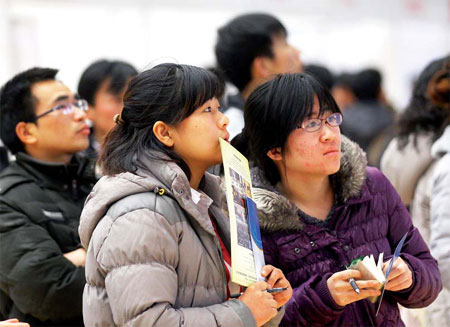IN BRIEF (Page 2)

| Two job seekers look for recruitment information at a job fair in Beijing earlier this year. Zou Hong / China Daily |
Employment
Labor shortage to affect prices
The working population is expected to stop growing next year, leading to labor shortages and higher inflation in the long term, a National People's Congress deputy said on March 4.
But the changes may also lead to an increase in wages for low-income workers.
"We should prepare for living with higher inflation in the coming years and not expect the consumer price index to be lower than 3 percent," said Cai Fang, director of the Institute of Population and Labor Economics at the Chinese Academy of Social Sciences.
The working population is classed as those aged between 15 and 64 who are fit for employment.
Defense
Growth in military outlay to slow
Despite new security concerns such as defending citizens and property overseas, the military spending growth rate in China is likely to slow this year.
The draft defense budget is 670 billion yuan ($106.4 billion, 80.7 billion euros), up 11.2 percent year-on-year, Li Zhaoxing, spokesman for the annual session of the national legislature, said on March 3.
The growth rate is down from last year's 12.7 percent.
Training, maintenance, equipment and salaries account for the largest bulk of military spending. Costs for research, procurement, repair, transport and storage of weapons and equipment, are also included in the budget, Li said.
Education
Spending raised to 4% of GDP
The central government has decided that government spending on education will account for 4 percent of the country's GDP this year, said Premier Wen Jiabao, when delivering the government report at the opening ceremony of the annual session of the National People's Congress on March 5.
Local budgets should also prepare to meet the target, he said.
"More resources should be allocated to central and western regions, rural and remote areas and places with concentrations of ethnic groups, to facilitate balanced development of compulsory education," he said.
Education spending accounted for 3.66 percent of the country's GDP in 2010.
Environment
Beijing leads with trash burning
Asia's largest household refuse incineration plant, which is under construction in Beijing, will become operational in October and have a daily processing capacity of 3,000 tons.
The plant is expected to handle one-fourth of the city's trash, and its annual energy output will exceed 300 million kilowatt hours.
Power and heat generated by the plant will be supplied to all four districts in western Beijing, Shougang Group, one of China's largest iron and steel companies, which invested more than 2 billion yuan ($317 million, 241million euros) in the project, said at a news conference on March 4.
China Daily

(China Daily 03/09/2012 page2)
Today's Top News
- Xi calls for promoting volunteer spirit to serve national rejuvenation
- Xi chairs CPC meeting to review report on central discipline inspection
- Reunification will only make Taiwan better
- Outline of Xi's thought on strengthening military published
- Targeted action plan to unleash consumption momentum
- Separatist plans of Lai slammed































